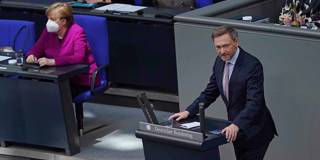Although Germany remains indispensable to European unity and solidarity, new polling shows that German citizens have begun to sour on the European project during the COVID-19 pandemic. If German politicians do not revise how they talk about Europe, this change of sentiment could have disastrous long-term consequences.
BERLIN – As Germany prepares for its federal elections in September, many are wondering what will come next. Under outgoing Chancellor Angela Merkel, Germany has become an “indispensable nation” in Europe and within the broader rules-based international order. The consensus is that she will be succeeded by someone offering more of the same. Her own anointed successor as leader of the Christian Democratic Union, Armin Laschet, is indeed running on a continuity platform.
And yet, as Merkel prepares to retire, there are signs that Germans are growing tired of their country’s traditional role within the European Union. Although there is no danger of Germany leaving the bloc or falling into the hands of a Euroskeptic party, polls commissioned by the European Council on Foreign Relations (ECFR) show that German trust in the EU has collapsed during the COVID-19 pandemic.
In 2019 and 2020, Germans expressed much more faith in the EU’s political system than French and Italian respondents did. But the European Commission’s poor performance during the pandemic seems to have changed their view. Some 55% of Germans now think the EU’s political system is broken – a jump of 11 percentage points since last year. Whereas one in two Germans believed that the system was working as of November 2020, only 36% do now, and 49% claim to have “less” or “much less” confidence in the EU as a result of its vaccines policy. Around 33% of Germans now think that EU integration has gone too far, compared to 23% in 2020.

BERLIN – As Germany prepares for its federal elections in September, many are wondering what will come next. Under outgoing Chancellor Angela Merkel, Germany has become an “indispensable nation” in Europe and within the broader rules-based international order. The consensus is that she will be succeeded by someone offering more of the same. Her own anointed successor as leader of the Christian Democratic Union, Armin Laschet, is indeed running on a continuity platform.
And yet, as Merkel prepares to retire, there are signs that Germans are growing tired of their country’s traditional role within the European Union. Although there is no danger of Germany leaving the bloc or falling into the hands of a Euroskeptic party, polls commissioned by the European Council on Foreign Relations (ECFR) show that German trust in the EU has collapsed during the COVID-19 pandemic.
In 2019 and 2020, Germans expressed much more faith in the EU’s political system than French and Italian respondents did. But the European Commission’s poor performance during the pandemic seems to have changed their view. Some 55% of Germans now think the EU’s political system is broken – a jump of 11 percentage points since last year. Whereas one in two Germans believed that the system was working as of November 2020, only 36% do now, and 49% claim to have “less” or “much less” confidence in the EU as a result of its vaccines policy. Around 33% of Germans now think that EU integration has gone too far, compared to 23% in 2020.